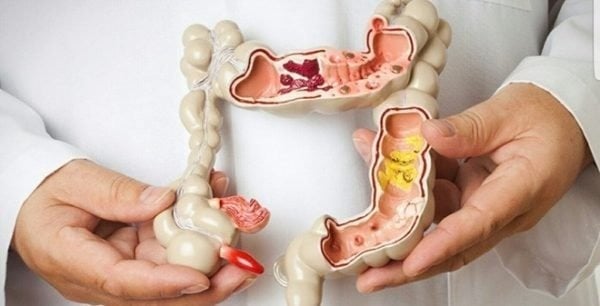Advanced rectal cancer occurs when the tumor has spread to distant tissues and organs beyond the rectum, such as the liver, lungs, bones, and brain. The liver and lungs are the most commonly affected sites of metastasis.
Symptoms of advanced rectal cancer include a combination of signs from the primary site and affected metastatic organs.
Prolonged constipation: Constipation may be present from the early stages of the disease but tends to worsen as it progresses to the advanced stage. It leads to a feeling of fullness, discomfort, and pain.

Bloody stools: As the rectal tumor grows and may undergo necrosis, rupture, or sloughing of the outer layer, blood can be present in the stool. This can also be due to lesions in the rectal wall and adjacent organs causing bleeding.
Abdominal pain and cramping: The growing tumor blocks the passage of food from the stomach to the intestines, resulting in cramping pain, mainly in the upper abdomen, which can radiate to other organs.
Fatigue, loss of appetite, and rapid weight loss: These are common systemic symptoms in patients with advanced rectal cancer.
Chest pain, cough, and hemoptysis: These symptoms indicate metastasis to the lungs.
Headache and facial paralysis: When the tumor metastasizes to the skull, individuals may experience severe headaches or loss of facial mobility.

Bone pain, muscle pain, and increased fracture risk: These are common signs when the cancer has metastasized to the bones.
In stage IV rectal cancer, the primary treatment goals are palliation of symptoms, improving quality of life, and prolonging survival. The prognosis for patients with rectal cancer at this stage is poor, with a survival rate of approximately 12-13%.
Treatment options in this stage typically include chemotherapy, radiotherapy, and surgery. If the patient’s health permits, surgery may be performed to remove the tumors (both primary and metastatic).
If the metastatic tumors are too large or numerous to be removed safely, chemotherapy may be administered first to shrink the tumors. Once they have reduced in size, surgery is performed for tumor resection. Chemotherapy may also be continued post-surgery to eradicate any remaining cancer cells. For tumors in the liver, alternative options may include resection or other interventional procedures to destroy the tumors.






































